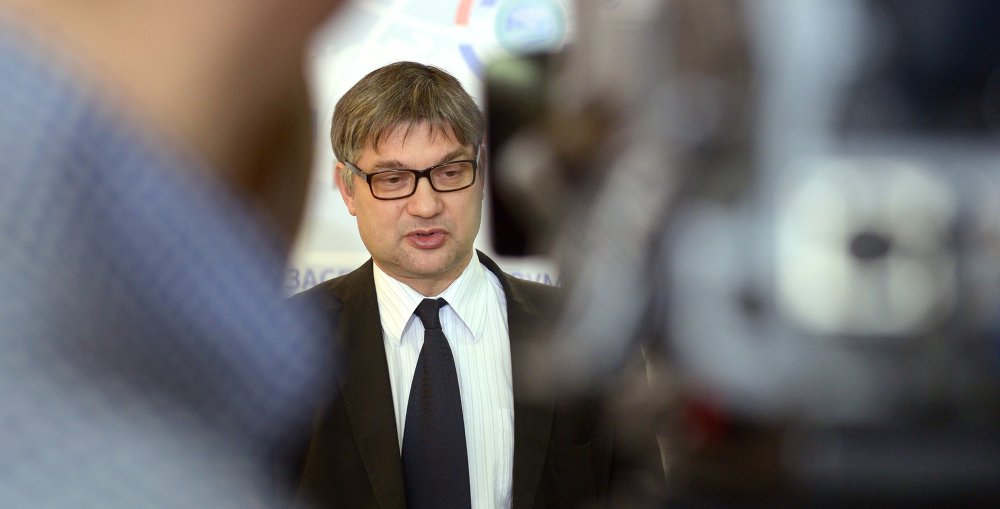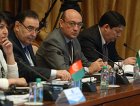
SCO Forum’s main themes: security, the economy, cultural cooperation and admission of new members
Question: Mr. Lukin, could you please sum up the results of the forum? What have you accomplished? What have you perhaps not managed? What did you expect to achieve?
Alexander Lukin: We're a public forum. We don't issue any instructions or make decisions. We discuss problems and give recommendations to our governments, foreign ministries and the SCO Secretariat.
We discussed four sets of issues: security, the economy, cultural cooperation and the admission of new members into the SCO. All these issues prompted heated debates.
Everyone agreed that the SCO has made the most achievements in the area of security, but there are some problems that primarily arise due to the international troop withdrawal from Afghanistan. Many SCO member states border on Afghanistan and are concerned over terrorism or the growth of drug trafficking. Although the SCO is not a military organisation and cannot take any drastic measures, it can still play a certain role in settling the situation.
We had a serious discussion on economic issues. The SCO Secretary-General even had to respond to criticism because many participants lashed out at the SCO and some governments for inadequate efforts to develop multilateral economic cooperation. In particular, they spoke about the failure to establish the SCO Development Bank, the formation of which has been discussed for eight years.
There were interesting speeches and proposals on cultural cooperation. A representative of the SCO Youth Council said at the session that, as distinct from older colleagues, their council is actively developing multilateral projects. Other speakers described the active work of the SCO University. It operates as a network of different universities in SCO member states and consists of Master's and Bachelor's programmes. Thus, two universities are dealing with this in Novosibirsk.
We had vigorous debates on the SCO's expansion. India and Pakistan are supposed to be admitted to it as fully-fledged members but not all experts think this is a good idea. Our centre in MGIMO has long been in favour of admitting them. Our experts believe that with India's entry, the SCO would gain a lot more clout in the world arena. Chinese experts are more cautious: some think it is better to refrain from expansion of the SCO. This is a debatable issue, but to my knowledge, the SCO is about to start the process of admitting India and Pakistan.
We had a large discussion about other countries that would also like to join the SCO. Japan, South Korea and some other countries unofficially expressed a certain interest, but Chinese experts had certain objections to this.
So, these are the results. By the way, we signed a protocol that you can read. It formulates all main results and contains recommendations.
Question: You spoke about the "Shanghai spirit". What is it?
Alexander Lukin: These are certain principles and values that highly developed in this region.
Thus, the SCO member states are resolute supporters of a multipolar world, the system of international law that took shape after World War II and the leading role of the UN Security Council. I'm referring to international politics and security.
The SCO member states want to preserve their own cultures, their cultural identity. Their region is the centre of at least two great civilisations: Chinese and Central Asian. I don't know whether Russia should be considered separate civilization - this is a subject of debate - but it is definitely a country with unique history. If India joins the SCO as a fully-fledged member, we will have another important civilisation.
It is important to preserve traditional culture without isolation from the outside world.
Question: What are the most topical issues on the SCO agenda? What could evoke heated debates at the Ufa Summit?
Alexander Lukin: These are certainly issues of economic cooperation. The formation of the SCO Development Bank is bound to be discussed and it remains to be seen what decisions will be made, whether the bank will be established and in what form. The heads of state have instructed their respective governments to formulate proposals on this score.
Admission of new members will also be discussed, of course, as well as the SCO's relations with other organisations, in particular, with the Eurasian Economic Union. I'm positive that the participants will review the issue of the SCO joining the programme on the economic belt of the Silk Route. Our leaders, in particular President Vladimir Putin and his Chinese counterpart Xi Jinping, have already said that the SCO should play a bigger role in this respect. The participants will certainly discuss specific forms of cooperation.
Question: Mr. Lukin, the host of the session, the Yugra Governor, made several proposals to the SCO Development Strategy yesterday. Which of these would you recommend?
Alexander Lukin: I'm of course familiar with these proposals. They contain many interesting ideas on cultural cooperation, primarily in education. As scientists we are mostly interested in establishing a SCO research fund because it will make our work more efficient.
There were different opinions on whether this should be mentioned in the protocol but it is obvious that the regions should play a bigger role in the SCO's work. Regional cooperation is very important. Universities of the SCO member states could certainly join the university network. I also think that Russia's 16 universities should expand their programmes.
Last but not least, the Khanty-Mansi Autonomous Area can play a major role in the energy sphere. The SCO is reviewing the issue of energy cooperation and has the Energy Club, which is not very active at the moment. The SCO's goal is to coordinate the interests of the biggest producers and consumers among its members. Russia and Iran are major producers, for one, while China and some other member states are consumers. There are many things to discuss in this respect.
